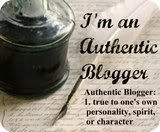Many people in this world do not have a great self-image, suffer from self-doubt, and all of that good stuff. While I don't believe in the "self-esteem movement" that basically indoctrinates kids to not worry about striving to be their best (but that's a whole other argument), I do believe that it's valuable to have a good opinion of yourself.
I've suffered from this for a long while, and it's been hard sometimes to bring myself out of these self-induced funks (which may be one of the things behind the writing ones I referenced on Saturday), but I am slowly getting better. It's hard work sometimes building that self-confidence that what you do is valuable, or that people actually like you for what you are.
It's these types of feelings that have led to recent posts in the last few months, such as "Companionable Silence," "The Limits of Sympathy," and "Reading Minds." Those posts stemmed from an outward expression of these self-doubts, wondering what your friends are "really" thinking rather than just taking them at face value.
It's a vicious cycle that can very possibly make you miserable. It's also a tough habit to break, no matter how much you've talked about it before.
Let me give you a recent example.
There was an instance in the past couple of weeks that I want to share. It involves something that I sometimes have felt internally that I haven't helped enough with, though the person involved keeps assuring me that I'm doing fine. Recently, due to other circumstances, I started doing a bit more. The person involved said later "I think it's awesome that you're helping with [fill in the blank]. I really appreciate it and it's made doing it a lot more fun." (not an exact quote, and I'm not saying what it was so as to not reveal who I'm talking about. This person will recognize it if they read it, however).
This person has always been open and direct with me. If there's a problem, it's stated. Yet my very first thought when hearing that was "that's a veiled slam at me not helping on this earlier, isn't it?" Thankfully, because of our history together, I very quickly dismissed that and took that to be the compliment and gratitude that it was. But it says something that my first thought went in that direction.
The other reason that I know this wasn't a veiled shot at me is because this person doesn't allow me to get down on myself, often asking why I said something when I do ("oh, that was my fault." "Why would you say that? It just happened."). So there's no reason that this person would have some kind of hidden meaning behind the words. They know what effect that would have on me.
I like to believe I'm getting better about these things, though I do have my stumbles. While I sometimes don't feel I'm doing as good of a job as I would like, I am doing things that I would not have done a few years ago (like putting myself out there on podcasts, for example). As those posts I shared above indicate, I don't always succeed, but the fact that I'm recognizing the issue is, I think, a good thing.
Then again, the trick is to avoid getting into the self-recrimination trap about self-recriminations. That would be a loop that's almost impossible to get out of it. Getting down on myself because I get down on myself so often?
Yet, funnily enough, that does happen on occasion too. It's like somebody saying "Stop apologizing!" and you say "sorry about that." Yeah, I'm apologizing for apologizing too much. That's helpful.
I think it's always a good thing to examine yourself and see if there are areas of improvement that you can implement. You just have to be constructive about it and actually work on improving that area, or accepting the fact that you are who you are, and that part will never change.
Either way, self-examination: good. Self-recrimination: bad.
(I didn't plan on this being a promotional link-fest, but I feel those posts illustrate things perfectly).
Subscribe to:
Post Comments (Atom)
















This is one of those dread diseases that infests probably 99.9999% of the world's population, I think. We all do it. Self-doubts, mind chatter that undermines us, self-defeating comments thrown out in conversation that we don't consciously monitor. I know I certainly do it. I do my best to catch myself when I do it and rephrase, just to put a more positive sentence and energy out there. After all, when we think it or speak it, an electrical reaction is occurring and that energy proceeds to float out there into the Cosmos. Universal Law (if you believe in it) dictates that those thoughts and words resonate in like kind and come back to us exactly as they were sent out.
ReplyDeleteThat concept, if nothing else, motivates me to temper my thoughts and words and be more mindful of what I'm presenting. Do I succeed at this every single day? Heck, no! But I do give it a very strong effort each day. I have found that the more I practice it, the more effortless an action it becomes. So, yep, self-examination and that refining of self IS good, but is best done in a loving and accepting manner. Great post, Dave!
- Dawnie
I can certainly see why you would avoid doing that, then! If you believe in that (and I'm still on the fence), then it's all the more reason to avoid thoughts like that.
ReplyDeleteNo matter what, though, it's definitely not a good thing to think those thoughts, and I do try my hardest not to. I am getting better, though I'm nowhere near where I need to be.
Thanks, Dawnie!!!!
I can relate to your story as i too suffer from self-recrimination. It's also something that is difficult to get rid of especially because it is an automatic response for people who are highly susceptible to the 'disease'. I actually have reduced social interaction because of my constant self-recrimination coupled with self-loathing and low self esteem.
ReplyDeleteThanks for stopping by, Futuski! Yeah, it is a painful cycle, isn't it?
ReplyDelete